Father of hybrid rice
Yuan Long-ping, the “father of hybrid rice,” had two dreams and he dedicated his entire life to making them a reality. One was a vision of a super breed of rice that grew as tall as Chinese sorghum and that was so high that he could hide in it, with grains the size of peanuts. The second dream was that this rice was grown all over the world, helping to end hunger and food insecurity.
Yuan, the Lui Che Woo Prize Laureate in 2016 for Sustainability, died in May this year aged 91. Over the course of his long and distinguished career he helped to feed the world, saving millions from starvation.
He was born in 1929 in Beijing and grew up in turbulent times, living through the civil war, as well as the Japanese occupation. But it was the great Chinese famine in the early sixties that cemented Yuan’s determination as a scientist to focus on feeding the country through the development of hybrid rice crops. The famine was one of the greatest disasters in history and tens of millions of Chinese starved to death. In a Lui Prize video in 2016, Yuan recalls seeing people with extended bellies and yellowing skin and that vision never left him. “Without food you can do nothing,” he said.
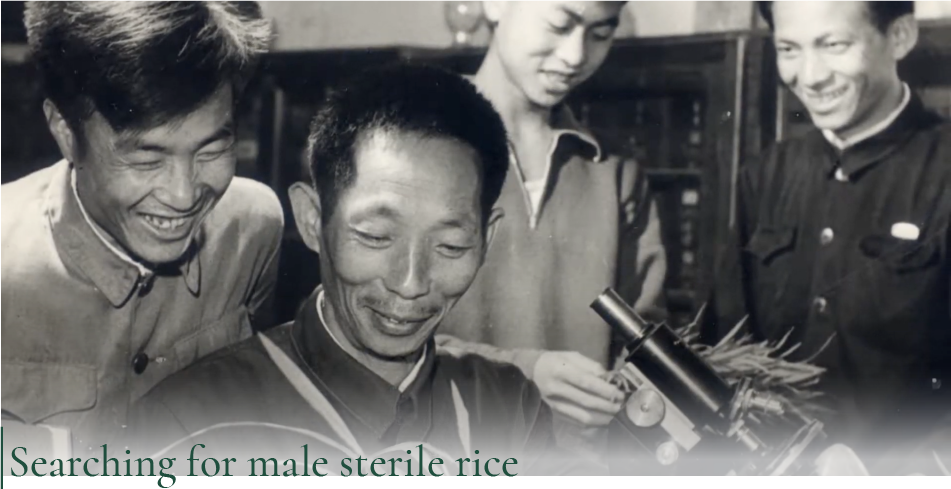
“I finally discovered the natural male sterile plant. How thrilled I was. It was the beginning of our research,”
The first breakthrough came when his team found a stretch of wild rice near a rail line on Hainan Island, China’s southernmost province which was part of Guangdong province then. It led Yuan to publish a paper explaining how genetic material from wild strains could be married with commercial strains. “I finally discovered the natural male sterile plant. How thrilled I was. It was the beginning of our research,” he said. That discovery led to China achieving food security in less than three decades. Now, a country that is home to a fifth of the world’s population can be fed using only nine percent of the world’s total arable land. Nearly 57 percent of China’s rice fields grow hybrid rice, with an increased output that can feed 70 million more people annually than was possible with normal varietals. The average national rice output in China is 430 kg per mu, while hybrid rice gets up to 500 kg.
Trained more than 3,000 scientists, benefiting more than 80 countries
Yuan has also achieved the second part of his dream, having trained more than 3,000 scientists, benefiting more than 80 countries. Students from around the world visit the China National Hybrid Rice Research and Development Center in Changsha to learn the techniques that may help solve hunger in their own countries.
Dr Lui Che-woo highlighted how Yuan willingly shared his technology with nations such as Bangladesh, Brazil, India, Indonesia, Myanmar, Pakistan and the Philippines, which have significantly increased their local food supply.
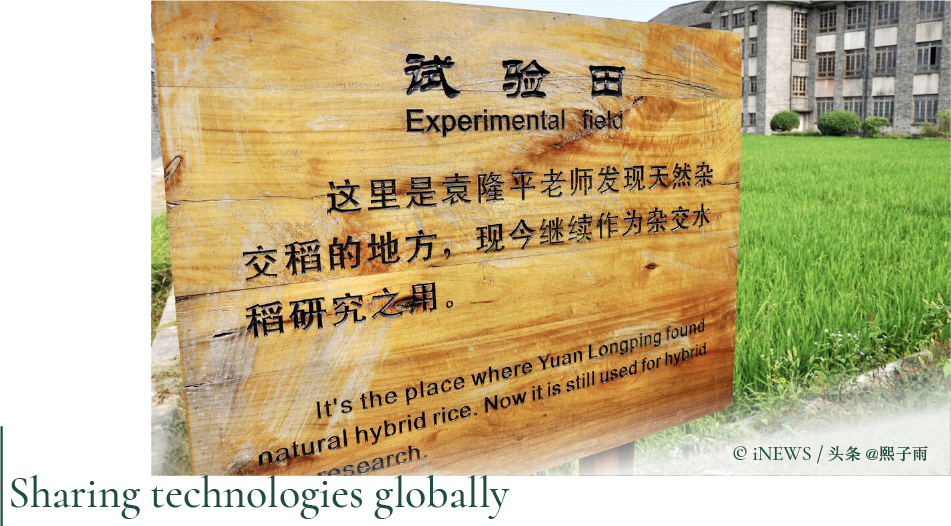
“A grain of rice looks very small, but it is enough to solve the world’s food problem. Yuan Long-ping’s sharing of technology around the world is a great idea,” Dr Lui said.Yuan’s death in May sparked an outpouring of national grief in China, with thousands flooding to the central Chinese city of Changsha to pay their last respects to the man who helped to feed the nation. His image was projected on LED screens in major cities and on social media platforms. While, international tributes poured in from the United Nations, the World Food Prize Foundation, the US Embassy in China, and top government officials from countries including Madagascar and Nigeria.
Dr Lui said he was personally deeply saddened by the passing of Yuan and he hopes that his research team will carry on with his legacy and find further breakthroughs in rice production research. “China has always been regarded as a weak, poor, and backward country. I hope that China’s elite talents will continue to do scientific research for China. So as not to fall into poverty again.”
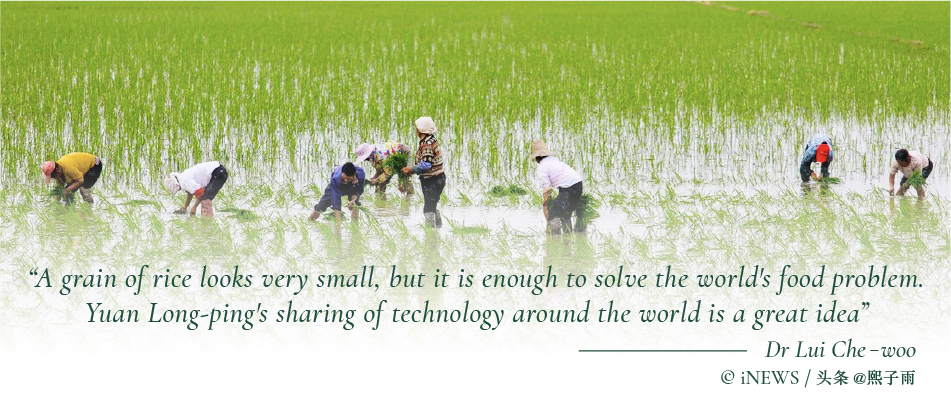
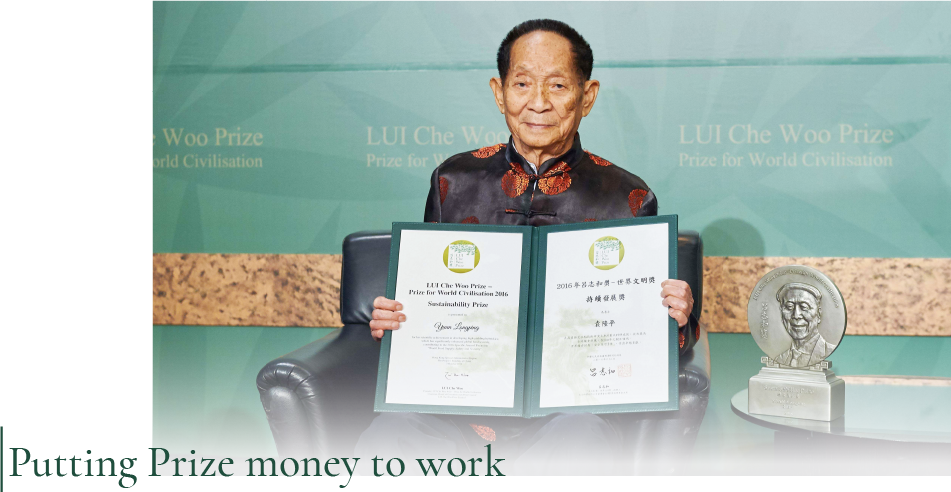
The Longping International Modern Agriculture Park
Yuan used his Prize money to buy fertilisers at his demonstration farms that are scattered across the country, as well as making donations to eight units and organisations that won the Yuan Longping Agricultural Science and Technology Award. His aim was to encourage the scientists to continue to promote the development of technologies to further improve hybrid rice. Dr Lui said Professor Yuan had personally invited him to visit one such park, but the Covid pandemic had made travel to Guangdong impossible. The Longping International Modern Agriculture Park in Huangpu district includes experimental fields studying hybrid rice, as well as other innovative agricultural techniques.
In recent years for example, Yuan has been working on developing saline-alkali-tolerant rice, seeking to breed varieties that are more tolerant to harsh environments. He has also been pushing for greener and more sustainable crops. In September 2017, a strain of low-cadmium indica rice developed by Yuan’s team and the Hunan Provincial Academy of Agricultural Sciences was able to reduce the average amount of cadmium in rice by more than 90 percent in areas affected by heavy metal pollution.

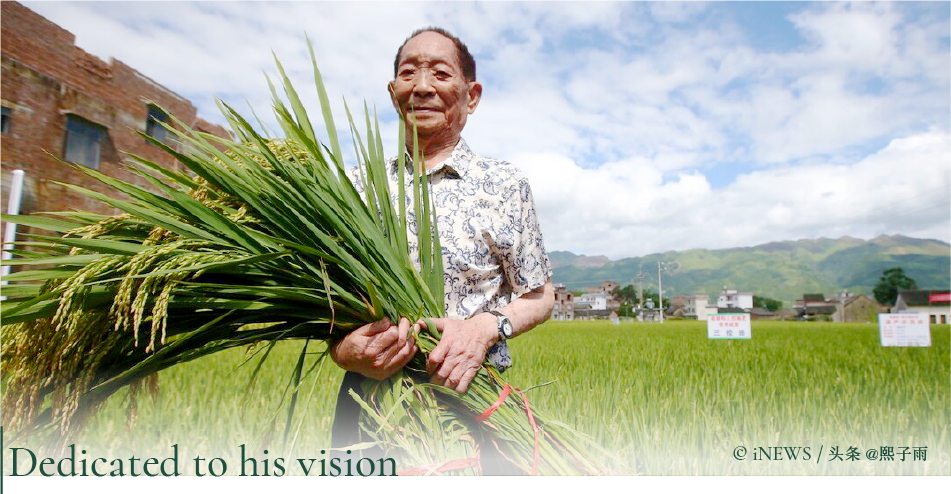
Passing on his legacy to the next generation
Those who knew him say Yuan was totally dedicated to scientific research and was not interested in fame or self promotion. Asked about the secret to his success, he listed four factors: knowledge, hard work, intuition and opportunity.
Despite his age, he continued to visit the fields each day to check on the progress of the crops, with his one concession to his advanced years being to drive rather than walk or cycle. Yuan will be remembered globally as the scientist who helped to lift millions out of hunger and who is passing on his legacy to the next generation of agronomists to put an end to global famine.
